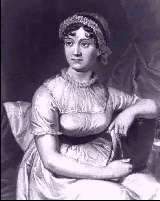
Born: December 16, 1775, in Steventon, Hampshire, England
Died: July 18, 1817, in Winchester, England
Jane Austen is considered the best woman author of all time, but her witty, satiric novels about everyday people living ordinary lives were unappreciated until the twentieth century. Her homey realism was a change from the melodramatic fiction being written at the turn of the eighteenth century. Her writing is described as a comedy of manners in middle-class England. A reoccurring theme is that maturity is gained through the loss of illusions.
Austen was the seventh of eight children, and the second daughter in the family. Her father, Reverend George Austen, was a rural clergyman. Her mother, Cassandra Leigh Austen, was known as an excellent storyteller and a charming dinner guest. Two of Austen's brothers followed their father into the church. Two others joined the navy and eventually made the rank of admiral.
Austen received some formal education at schools in Oxford, Reading, and Southampton, but her tutoring ended when she was nine. After this, her Oxford- educated father took on the task of teaching his daughter. Austen learned some Italian, French and history at home. She was well read in Shakespeare and Milton, and the poets, novelists and essayists of the eighteenth century. During the summer, the family entertained friends and neighbors with comic plays they performed on an improvised stage in the barn and moved into the house for the winter. They often conscripted locals for community productions.
Love is the central theme of many of Austen's novels. Because her books deal with the subject in such a deep and sensitive manner, many have speculated on her experience. Known as shy and well -mannered, Austen was courted by a number of suitors, but never married. She accepted a proposal of marriage from a long-standing friend, Harris Bigg-Wither, but ended the engagement the next day when she realized she did not love him. Apparently, the one true love of her life, probably a clergyman or a sailor, ended when he was killed. His name, along with many other facts of her life will forever remain a mystery because her family cut up and censored many of her letters after she died.
Austen lived with her parents all her life. In 1801, after the retirement of her father, the family moved to Bath, along with her sister and closest companion, Cassandra. When George Austen died in 1805, they spent three years in Southampton, before settling in the cottage at Chawton, Hampshire. It was in this house she composed all the final drafts of her works.
Sense and Sensibility, Austen's first book, was published October 31, 1881, twelve years after she first offered it to a publisher. Thomas Egerton agreed to publish it only if Austen agreed to pay the loss. However, the reviews were good and she made £140.
At age thirty-five, she continued to produce a novel a year for the next five. Established, but still unacknowledged as author, Austen published Pride and Prejudice in January 1813. Apparently the Prince Regent, later George the IV, discreetly commanded that Emma, published in 1815, be dedicated to him.
In 1816, her health began to fail. Today, doctors suspect she was suffering from Addison's disease. A few months before her death, she moved to Winchester for medical attention, but she died in the hospital and was buried at Winchester Cathedral. After her death, her authorship was officially announced by her brother Henry, who supervised the publication of Northanger Abby and Persuasion.